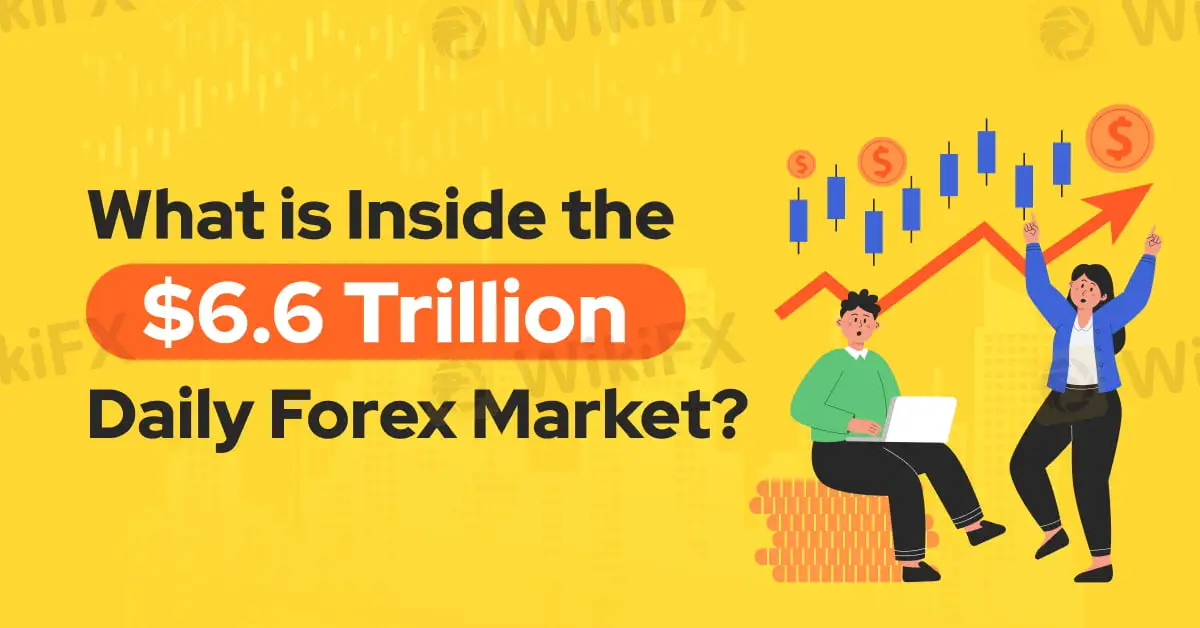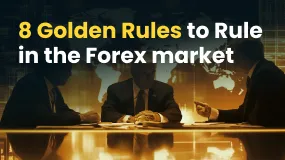简体中文
繁體中文
English
Pусский
日本語
ภาษาไทย
Tiếng Việt
Bahasa Indonesia
Español
हिन्दी
Filippiiniläinen
Français
Deutsch
Português
Türkçe
한국어
العربية
What is Inside the $6.6 Trillion Daily Forex Market?
Abstract:This article explores the vast influence of the $6.6 trillion foreign exchange market, its role in global trade, the impact of the floating exchange rate system, and the key players shaping currency values.

The foreign exchange (forex) market stands as one of the most influential and dynamic financial markets in the world. With a staggering daily trading volume of approximately $6.6 trillion, the forex market dwarfs the combined trading volumes of major global stock exchanges. This immense market size reflects the critical role forex plays in global economics, where currency exchange is integral to international trade, investment, and economic policy.
The growth of global trade, driven by the principle of comparative advantage, has necessitated the development of a robust and fluid foreign exchange market. Comparative advantage enables countries to specialize in the production of goods they can produce most efficiently, leading to a thriving international trade network. As goods and services flow across borders, so too does the need for currency exchange, reinforcing the importance of the forex market in the global economy.

The evolution of the forex market can be traced back to the collapse of the Bretton Woods system in the 1970s. Under Bretton Woods, currencies were pegged to the US dollar, which in turn was tied to gold. The system's collapse led to the adoption of floating exchange rates, where currencies are traded freely on the open market, much like commodities. This shift significantly increased the influence and volatility of the forex market, as currencies began to fluctuate based on supply and demand dynamics.
Key players in the forex market include businesses, investors, and governments, each with distinct motivations and strategies. Businesses engage in forex trading to support their international operations, such as opening new stores abroad or paying suppliers in different currencies. Investors, on the other hand, use forex to hedge against currency risks or to speculate on exchange rate movements, often employing financial instruments like derivatives to maximize profits. Governments also play a crucial role in the forex market, often manipulating their currencies to achieve economic objectives. For instance, China has been known to devalue its currency to make its exports more competitive on the global stage.
Despite the forex market's importance, the intrinsic value of currencies remains a complex and often debated topic. Unlike tangible goods, currencies, shares, and derivatives lack intrinsic value; their worth is determined by market perception and what others are willing to exchange for them. This concept is exemplified by the British Pound, which remains one of the most valuable currencies globally, largely due to historical factors rather than solid economic foundations.
In essence, the forex market's vast scale, influence, and complexity underscore its pivotal role in the global economy. It facilitates international trade, supports investment strategies, and allows governments to pursue economic policies, all while operating in a landscape where the value of currencies is determined by perception rather than intrinsic worth.

Disclaimer:
The views in this article only represent the author's personal views, and do not constitute investment advice on this platform. This platform does not guarantee the accuracy, completeness and timeliness of the information in the article, and will not be liable for any loss caused by the use of or reliance on the information in the article.
Read more

Harsh Truths About ATC Brokers Every Trader Must Know
Many regulated brokers hide the risks associated with them. They never talk about these risks and try to attract customers with appealing offers. Later on, customers discover these hidden risks and feel disappointed. Before you come across a similar situation, we want to let you know the risks involved with ATC Broker. Check out the article to discover the harsh truth about it.

8 Golden Rules to Rule in the Forex market
These are important rules that most people won’t tell you. Whether you’re new to Forex beginner or have been trading for a while, these tips can help improve your trading journey. Read this article to learn the key rules every trader should keep in mind.

Top Reasons Why Prime FX CFD is Not Worth Your Investment
Prime FX CFD is constantly grabbing headlines, but not for the right reasons. It has become an infamous name in the forex market, which, otherwise, has become the reason for many becoming financially independent globally. Investors have been taken for granted as scams keep happening. We have found some red flags with this scam forex broker. In this article, we will let you know about them. Keep reading!

5 Clear Reasons Why Ultima Markets Is Smart Investment?
The Right Investment is hard to find these days. The Forex market is full of scam brokers, and it's a tough task to find the trusted ones. However, you can check out this article to discover 5 specific reasons why Ultima Markets stands out as a reliable choice.
WikiFX Broker
Latest News
Alchemy Markets: A Closer Look at Its Licenses
Wondering Why Your International Earnings Come Less Than Expected? It's Because of Forex Markup Fees
FCA to modernise rules to unlock investment
How Fake News Sites Are Fueling a Global Investment Scam Epidemic
From Novice to Pro: Why Investors Trust Land Prime?
10-year Treasury yield ticks lower after core CPI comes in slightly lightly lower than expected
Asia-Pacific markets mixed after Trump's tariffs on Indonesia
Labubu craze to drive up profit 350%, China\s Pop Mart says
PrimeXBT Launches MT5 PRO Account for Active Traders
Central banks are increasingly buying gold from local mines as prices surge
Currency Calculator


